Discover the Benefits of Live Baking Classes

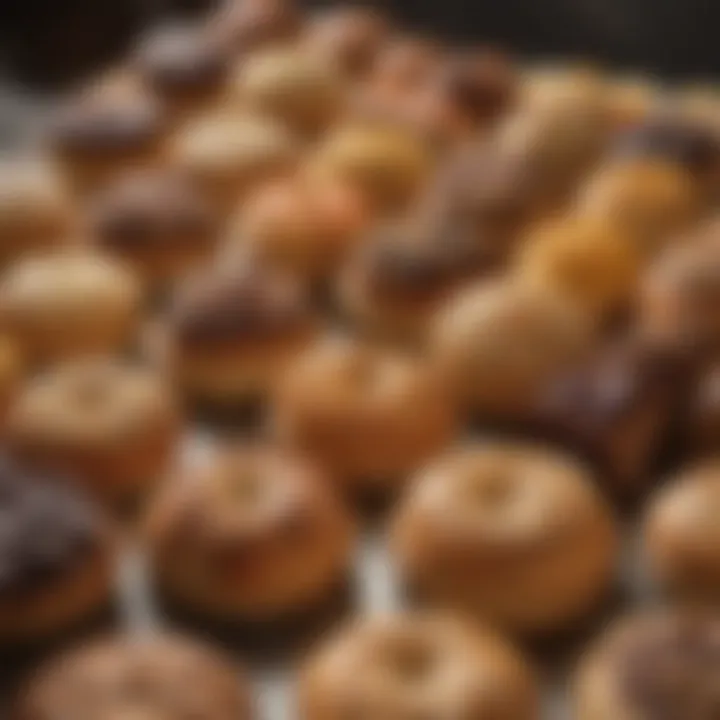
Intro
The concept of live baking classes has gained significant traction in recent years as technology bridges the gap between enthusiasts and experienced bakers. These classes offer a unique opportunity to learn new techniques, explore diverse recipes, and engage with fellow culinary enthusiasts from around the globe. The interactivity of live sessions allows participants to ask questions in real-time, share experiences, and receive immediate feedback on their baking endeavors.
Live baking classes are not just about following a recipe; they provide an immersive experience that cultivates a sense of community. Participants can connect with others who share their passion for baking, while also gaining insight into various cultural traditions that influence baking practices worldwide. The enhancement of skills goes beyond simply learning how to make bread or pastries; it reflects a deeper understanding of the culinary arts.
As we explore the dimensions of live baking classes, we will examine their various formats, the benefits and challenges they present, and the platforms that host these classes. Furthermore, we will highlight the importance of community engagement and the cultural diversity that these classes embody. By synthesizing the information presented, this article aims to illuminate the multifaceted nature of live baking classes and their role in promoting appreciation for global culinary traditions.
Intro to Live Baking Classes
In recent years, live baking classes have gained notable prominence in the culinary landscape. This format offers a unique approach to learning, combining the rigor of traditional education with the convenience of modern technology. The appeal of live baking classes lies not just in acquiring new culinary skills, but also in enjoying the interactive experience that these classes provide.
One key aspect of live baking classes is the opportunity for real-time engagement. Participants can connect with instructors and other bakers, fostering a sense of community that might be missing in more static learning formats. This atmosphere encourages learners to ask questions, share experiences, and receive immediate feedback on their baking practice.
Definition of Live Baking Classes
Live baking classes refer to cooking lessons that occur in real-time, typically through an online platform. In these classes, participants can follow along with a chef or instructor as they demonstrate various baking techniques. Attention is given to details such as measuring ingredients, mixing techniques, and baking times, which help learners develop their culinary skills as they actively participate.
These classes can serve different skill levels, from beginners looking to develop basic techniques to advanced bakers seeking to refine their craft. Moreover, the definition of these classes often includes an array of specialty topics, such as artisan bread making or pastry creation, catering to diverse interests in baking.
The Emergence of Online Culinary Education
The rapid evolution of digital technology has transformed many areas, and culinary education is no exception. Online culinary education began to emerge as a practical alternative to traditional cooking schools. With the advent of platforms supporting video conferencing, educators have been able to reach wider audiences. Online culinary education has democratized access to knowledge, enabling individuals to learn from renowned chefs around the world without geographical constraints.
Simultaneously, the global pandemic accelerated this trend. Many people turned to baking as a comfort activity, resulting in a surge of interest in virtual cooking classes. Live baking classes became a way for enthusiasts to connect, share their creations, and engage in a collaborative learning environment. This paradigm shift has cemented live baking classes as a valuable component of modern culinary education, offering unparalleled opportunities for skill development and community building.
Format Variations of Live Baking Classes
Understanding the different formats of live baking classes is essential for culinary enthusiasts to choose the right experience that fits their needs and preferences. Each format offers unique advantages and considerations that cater to various learning styles. Moreover, this section provides insights into how these formats can influence the overall learning experience.
Real-Time Classes
Real-time classes are conducted in a live setting where instructors and participants interact simultaneously. This format allows learners to engage directly with the instructor, ask questions, and receive immediate feedback on their techniques and results.
The importance of real-time classes lies in their ability to create a dynamic learning environment. Participants can discuss challenges they encounter during the baking process and benefit from tailored advice given on the spot. This format fosters a sense of community as participants share their experiences and outcomes.
However, students must consider timing and scheduling. If a class is offered at inconvenient hours, it can limit participation. Therefore, it’s essential for those interested to check the schedule before enrolling.
Pre-Recorded Sessions
Pre-recorded sessions offer a flexible alternative to live classes. Learners can access these classes at their leisure. Instructors prepare content that participants can view multiple times, which is valuable for complex baking techniques that require repetition.
While pre-recorded classes may lack immediate interaction, they often provide comprehensive resources like downloadable recipes and instructional materials. This structure supports learners who prefer a self-paced approach. Participants can take notes without the pressure of a live format and revisit sections of the class as needed.
Nonetheless, the lack of real-time guidance may hinder some learners, specifically those who thrive on immediate corrections and advice. This format suits individuals who are more experienced or those who are comfortable learning independently.
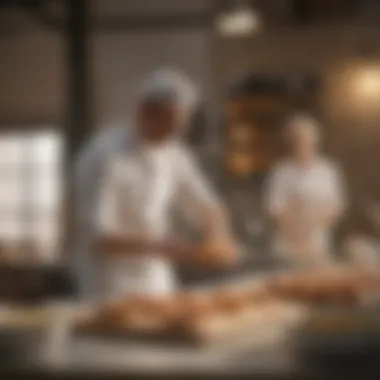
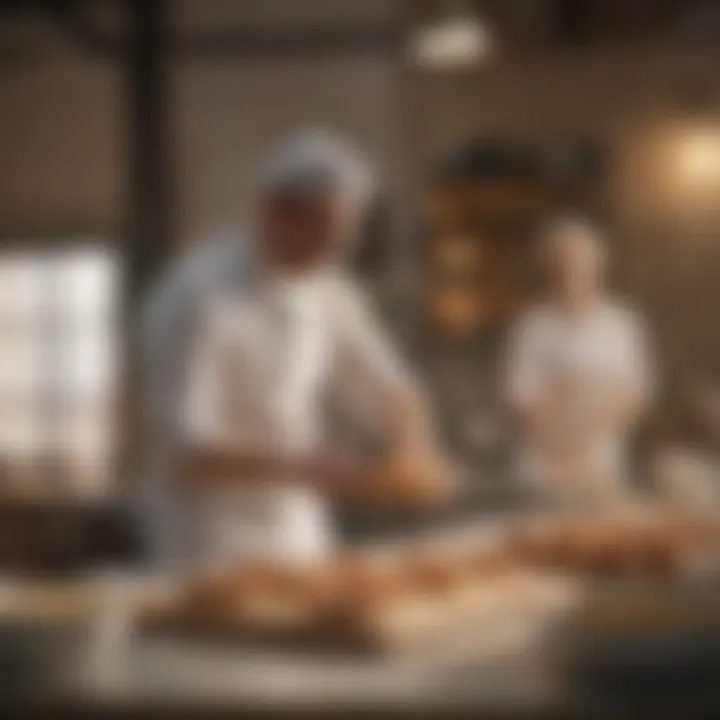
Hybrid Model
The hybrid model merges the benefits of both real-time and pre-recorded classes. Instructors provide live sessions complemented by recorded materials for future reference. This combination supports varied learning preferences while maintaining engagement.
Learners can participate in live discussions and still have the option to revisit recorded content later to reinforce their understanding. It offers a balance of interaction and flexibility that can appeal to a wider audience. However, a downside might be that participants need to commit time for real-time sessions while also managing their schedules around the pre-recorded content.
Ultimately, choosing the right format can enhance the learning experience. Future bakers should consider how each format complements their lifestyle and goals. In understanding these variations, learners can make informed decisions, thereby enhancing their skills in the rich world of baking.
Benefits of Participating in Live Baking Classes
Live baking classes offer numerous advantages for culinary enthusiasts. The interactive nature of these classes helps participants to refine their baking skills in a more engaging environment. It fosters a sense of community, where learners can share experiences and outcomes. One significant benefit is that it allows individuals to learn directly from experts. This guidance can significantly enhance a student’s baking capabilities, making the learning process more effective.
Interactive Learning Experience
Direct Feedback from Instructors
Direct feedback from instructors is a profound aspect of live baking classes. This characteristic allows students to receive immediate responses to their queries or mistakes. Such prompt guidance can prevent simple errors from becoming ingrained habits. The real-time interaction facilitates a deeper understanding of techniques. This feature is especially beneficial for beginners who might feel overwhelmed by the process of baking. Having an expert to clarify misunderstandings can be invaluable. In this environment, students can also observe techniques at work, making it easier to comprehend and replicate them.
Real-Time Problem Solving
Real-time problem solving stands out as another critical feature of live baking classes. When challenges arise during cooking, learners can receive instant support from their instructors. This capability enhances the overall learning experience by addressing issues as they occur. Participants can share their specific difficulties, allowing tutors to provide tailored solutions. This immediate assistance encourages experimentation without the fear of making mistakes. Consequently, students can adapt techniques in a practical and supportive setting, which ultimately builds confidence in their baking skills.
Development of Baking Skills
Techniques and Tips
Techniques and tips are foundational to mastering baking, making this aspect of live classes particularly essential. Experienced instructors share their insights into various methods that enhance the baking process. Strategies such as the proper creaming of butter and sugar, or mastering temperature control, can significantly alter outcomes. Participants gain not just knowledge but also practical techniques that can be applied in their baking endeavors. This practical wisdom distinguishes the live format from traditional baking resources, which may lack immediate application.
Ingredient Knowledge
Ingredient knowledge is critical in baking, as it directly influences flavor and texture. Understanding the roles of elements like flour, sugar, and leaveners is crucial for success. In live classes, instructors can elaborate on the purpose of each ingredient. This understanding turns baking from a mere following of recipes into a science. Participants can experiment with different components, fostering creativity. Knowing how to adjust recipes based on available ingredients or dietary restrictions adds adaptability to students’ skills.
Cultural Exchange Through Baking
Exploring Global Recipes
Exploring global recipes in live baking classes broadens culinary horizons. Participants can learn traditional baking methods from various cultures. This exposure leads to a greater appreciation for different flavors and techniques. It also fosters an environment of culinary diversity, where students can experiment with international recipes. Such exploration not only enhances skills but also introduces participants to new cultural traditions surrounding food.
Understanding Traditions
Understanding traditions related to baking forms a beautiful narrative in live classes. Learning about the cultural significance of specific recipes allows participants to connect more deeply with the food they bake. This understanding enriches the experience, emphasizing that baking is not just a technical activity but a reflection of cultural heritage. Knowing the stories behind recipes can inspire students to embrace their backgrounds while developing their baking styles.
Challenges of Live Baking Classes
Live baking classes represent an innovative approach to culinary education. However, they present several challenges that can affect the learning experience. Understanding these challenges is essential for both instructors and participants. They determine not just how classes are run, but also how effective they can be in enhancing baking skills and knowledge.
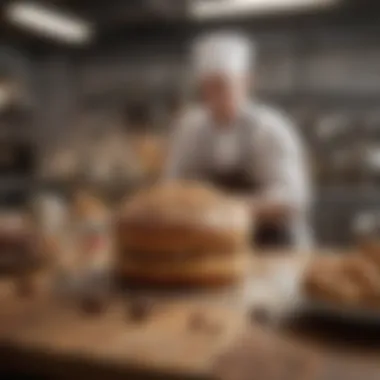
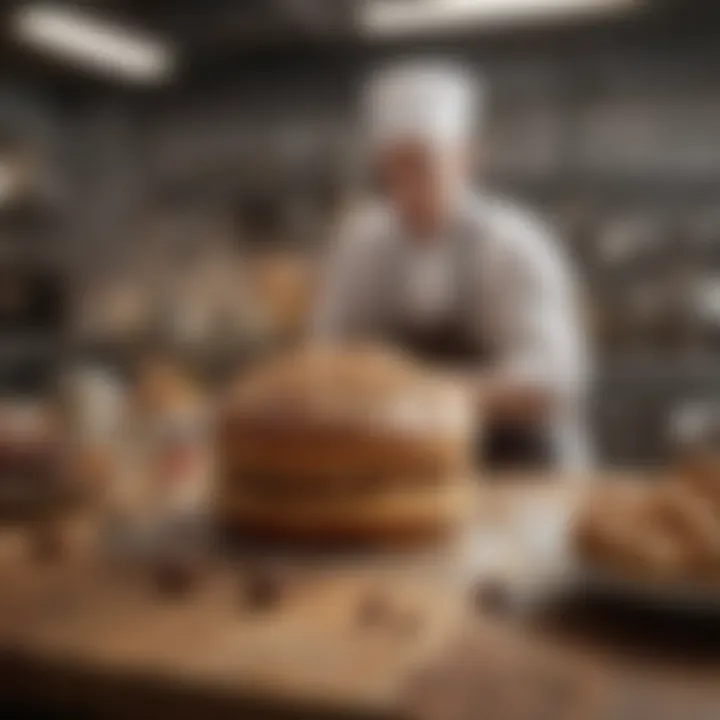
Technological Barriers
Connection Issues
Connection issues are a significant hindrance in live baking classes. Many participants join from various locations, which can lead to unstable internet connections. If someone's connection drops, it disrupts not only their learning but also that of others. This inconsistency can lead to frustration and diminished engagement.
A key characteristic of this problem is its unpredictability. Not every participant has access to high-speed internet. This barrier affects the video quality and the delivery of instructions. When classes rely heavily on visual guidance, any lag in video can cause confusion. A beneficial choice to overcome this challenge is to encourage recordings of sessions. This way, if someone misses parts due to connection issues, they can catch up later. However, this also raises a question: does the absence of real-time interaction lessen the learning experience? The answer suggests that while recordings help, they cannot fully replace the dynamic interaction during live classes.
Platform Limitations
Platform limitations can also affect the experience of live baking classes. Different platforms may have varied functionalities. Some platforms may restrict the number of participants, which can limit the accessibility of the class. If a class becomes full, newcomers may not be able to join, which hinders community building among learners.
Additionally, certain platforms might lack features that facilitate real-time engagement, such as breakout rooms or interactive chat options. The ability to communicate effectively during a session is crucial for learning. With limited functionality, participants may feel disconnected from instructors, which diminishes the benefit of live teaching. Many users find it frustrating when their platform does not support features like screen sharing or easy video playback. Thus, selecting the right platform is integral to ensuring that live baking classes reach their full potential.
Time Zone Differences
Time zone differences present yet another challenge in live baking classes. In an increasingly globalized world, participants often join from different continents. This means that scheduling classes at convenient times for everyone is difficult. A class that works well for an instructor might not be suitable for all participants.
As instructors plan their classes, they must consider how time zones affect attendance. If a class is conducted at a time that is inconvenient for a large number of participants, they may miss out. This can lead to reduced community engagement and less interaction during sessions.
Instructor Availability
Instructor availability is crucial for the success of live baking classes. If instructors have limited time slots, participants may find it hard to join at those times. This can create a gap in learning, where participants do not have access to guidance when they need it most. Furthermore, as baking requires practice, extended availability is ideal for students to ask questions and seek assistance.
The key here is to establish a balance of availability that works for both instructors and participants. Some instructors may offer office hours or additional sessions to facilitate learning. This flexibility can enhance the overall experience, allowing learners to gain more from their interactive classes.
Overall, while live baking classes offer a unique and engaging learning experience, these challenges can affect their effectiveness. Participants and educators must be aware of these barriers to find ways to mitigate them. Through open communication and thoughtful planning, the potential issues surrounding these classes can lead to fruitful baking experiences.
Platforms Offering Live Baking Classes
In the current culinary landscape, the rise of live baking classes is propelled by various platforms that make these learning experiences accessible and engaging. These platforms function as the bridge between aspiring bakers and experienced instructors, facilitating an interactive way to learn baking skills from the comfort of one's kitchen. Each platform offers distinct features that cater to different learning preferences and technological accessibility. Understanding these platforms is crucial for anyone interested in participating in live baking classes.
Online Culinary Schools
Online culinary schools provide structured courses with professional guidance. They typically offer a curriculum that spans various baking techniques and styles, often led by experienced chefs. The significance here lies in the quality of education provided, as these schools employ a systematic approach to teaching.
Benefits of using online culinary schools include:
- Comprehensive course materials
- Access to a network of fellow bakers
- Certification upon completion, which might be helpful for career advancement.
However, the cost can be a barrier for some, as these institutions may charge tuition fees. Additionally, the requirement for committed time can deter potential bakers who are balancing other responsibilities.
Social Media Platforms
Social media platforms have rapidly become popular venues for live baking classes. They offer an informal style of learning that appeals to a wider audience. Within this category, notable platforms include Instagram Live and Facebook Groups.


Instagram Live
Instagram Live stands out as a platform that leverages its visual nature to enhance learning. Bakers can broadcast their baking sessions in real-time, allowing viewers to engage directly with the process. One key characteristic of Instagram Live is its immediacy; bakers can respond to questions and feedback instantly. This interactivity creates a dynamic environment where learning can occur organically.
Advantages of using Instagram Live include:
- Visual engagement—viewers can see every step clearly.
- Ability to reach and connect with a global audience.
- Informal and accessible format encourages interaction.
Despite its benefits, some disadvantages exist, such as potential technical difficulties and the fleeting nature of live content, which may not be recorded for later viewing. This can limit the opportunity to revisit complex techniques.
Facebook Groups
Facebook Groups also offer a unique approach to live baking classes. These groups, often centered around specific baking topics or styles, provide a community-driven environment. Members can participate in scheduled live classes and later engage in discussions or share results.
A major characteristic of Facebook Groups is their sense of community, allowing members to support each other’s baking endeavors. This environment encourages collaboration and exchange of tips.
Key points for Facebook Groups include:
- Connection with fellow baking enthusiasts.
- Space for sharing successes, challenges, and recipes.
However, this platform might lack the formality and structured content found in dedicated culinary schools, which can be a downside for those looking for in-depth learning.
Dedicated Baking Websites
Dedicated baking websites represent a more targeted resource for live baking classes. Platforms such as King Arthur Baking Company and Bake with Jack focus entirely on baking-related content. These websites often feature expert bakers and provide a wealth of resources, including live classes, tutorials, and articles on baking techniques.
The main advantages of using dedicated baking websites are:
- Focused content tailored to baking enthusiasts.
- Access to a wealth of baking resources beyond just live classes, including recipes, tips, and forums for discussion.
Yet, these sites might require a subscription for full access, which can be a consideration for those not ready to invest.
In summary, the variety of platforms offering live baking classes caters to diverse baking enthusiasts' preferences. Each platform has its strengths and weaknesses, yet all contribute to the growing interest in live baking as a viable method of culinary education.
Finale: The Future of Live Baking Classes
As the landscape of culinary education evolves, the importance of live baking classes becomes increasingly apparent. They serve not only as an educational tool but also as a vibrant platform for cultural exchange and community building. By harnessing technology, these classes make baking accessible to a wider audience, breaking geographical boundaries and offering diverse culinary experiences.
Evolving Trends in Culinary Education
In recent years, there have been notable shifts in how culinary education is delivered. Traditional in-person classes are now complemented by online offerings, especially live classes that encourage real-time participation. This evolution is driven by several factors:
- Accessibility: More people can join from anywhere in the world, often at lower costs.
- Flexibility: Participants can choose classes that fit their schedules, catering to busy lifestyles.
- Diversity of Instruction: A variety of chefs and instructors from different backgrounds contribute unique perspectives and techniques.
These trends are not just fads; they reflect a growing recognition of the need for inclusive and versatile cooking education. Culinary enthusiasts can expect to see an increase in specialized classes focusing on dietary restrictions, cultural cuisines, and advanced baking techniques.
Longevity of Community Engagement
The community aspect of live baking classes is critical for their future. Engaging with others who share similar interests fosters a sense of belonging and motivation. This social interaction can manifest in various ways:
- Collaborative Projects: Participants often take on group challenges or bake-offs, which strengthen camaraderie.
- Feedback Loop: Instant feedback from instructors can enhance learning and encourage sharing of personal experiences or tips among participants.
- Support Networks: Online forums and social media groups related to the classes cultivate ongoing relationships beyond the live sessions.



